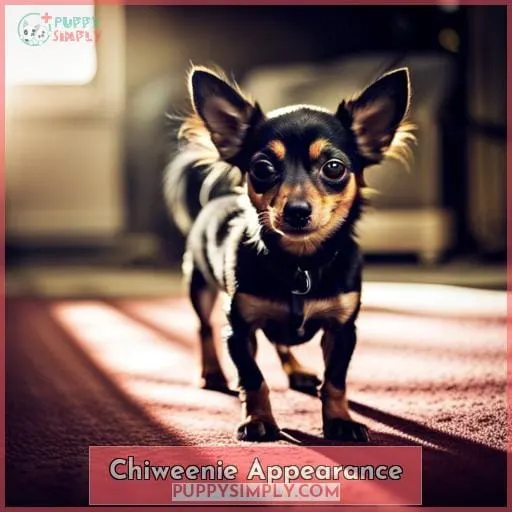This site is supported by our readers. We may earn a commission, at no cost to you, if you purchase through links.
 Curious about the lovable Chiweenie dog breed? This guide gives the essential info you need to know before adding one of these spirited hybrid puppies to your family.
Curious about the lovable Chiweenie dog breed? This guide gives the essential info you need to know before adding one of these spirited hybrid puppies to your family.
We’ll cover everything from their appearance, temperament and care requirements to common health issues. Get the 101 on these charming little dogs that will steal your heart. You may find that a Chiweenie could be the perfect fit for your lifestyle.
Table Of Contents
- Key Takeaways
- Quick Facts
- Chiweenie Appearance
- Chiweenie Temperament
- Trainability of Chiweenies
- Living Needs of Chiweenies
- Chiweenie Care
- Common Health Issues in Chiweenies
- History and Origin of Chiweenies
- Finding a Chiweenie
- Is a Chiweenie the Right Dog for You?
- Frequently Asked Questions (FAQs)
- Are Chiweenies hypoallergenic or suitable for people with allergies?
- How do Chiweenies typically interact with strangers and visitors in the household?
- What are the common tendencies or challenges in Chiweenie behavior when left alone for extended periods?
- Can Chiweenies thrive in households with multiple pets, especially larger dogs or different species?
- What are some distinct personality traits or behaviors that differentiate Chiweenies from their parent breeds?
- Conclusion
Key Takeaways
- Chiweenies exhibit diverse appearances, with coat variations including smooth, long-haired, and wire-haired types.
- They have moderate exercise needs, suited for apartment living with daily short walks and active indoor play.
- Proper socialization and training are vital for their success in apartment settings.
- Weight management through regulated diet and exercise is crucial due to their small size and high energy.
Quick Facts
Your Chiweenie’s a pint-sized hybrid with boundless liveliness emanating from its Dachshund and Chihuahua lineage.
Weighing 10-20 pounds and reaching 10-12 inches, these petite pups exhibit coat diversity from smooth to long and wiry inherited from their parent breeds.
Their zest for life contends with stubborn streaks and training challenges requiring patience and positive reinforcement.
Apartment living suits their small size but shedding, intelligence, and moderate grooming needs factor into care.
Health considerations like patellar luxation and eye/skin issues are relatively few for this generally robust crossbreed.
Chiweenies have grown fashionable for their lively, affectionate nature, yet responsible ownership includes meeting their needs.
Chiweenie Appearance
When it comes to the looks of Chiweenies, there’s considerable variety due to their mixed parentage.
Chiweenies typically measure between 10-12 inches tall, with a weight range of 10-20 pounds, but coat types can differ widely depending on whether the Chihuahua or Dachshund parentage dominates.
You’ll find smooth, longhaired, and wire-haired coats in an array of colors from these petite pups.
Size
One’s Chiweenie’s size can vary quite a bit, with these dogs typically standing between 8 and 12 inches tall and weighing between 10 and 20 pounds, though some may be smaller or larger.
A Chiweenie’s ultimate size depends on which parent breed is more dominant. Those favoring the Chihuahua side stay quite petite while Dachshund characteristics lead to a longer, larger dog.
Their small stature makes them well-suited for apartment living, though their energetic, playful temperament necessitates daily walks and playtime.
Careful monitoring of diet and weight is essential no matter the Chiweenie’s proportions.
Coat Type
Their coats can vary widely depending on which parent they take after more, with both smooth and long-haired varieties possible given the range of Dachshund and Chihuahua coat types that occur in the mix.
Consider seasonal sweaters for cold tolerance and regular brushing for shedding control.
Their cute appearance makes them quite fashionable, though be mindful of overheating risks.
Chiweenie Temperament
When considering a Chiweenie, you’ll want to learn about their affectionate yet feisty personality.
They form strong bonds with their families, get along well with children and other pets when properly socialized, but also tend to bark persistently when left alone too long or not sufficiently stimulated.
Understanding these key aspects of the Chiweenie temperament will help you determine if this mix is the right fit for your home.
Affectionate and Loyal
These little dogs are known for being extremely affectionate and loyal to their owners.
Forming strong emotional bonds and displaying unwavering devotion, Chiweenies cherish playful companionship and affectionate allure.
With their charm and loyalty dynamics, they become faithful friends.
Chiweenies build lasting relationships, showering their families with joy and affection.
As delightful companions, they live to love their people.
Good With Kids and Other Animals
While Chiweenies are devoted and loving little dogs, you don’t need to be concerned if you have kids or other pets because they’re typically very friendly, good-natured, and willing to socialize with all members of the family.
Proper introduction and supervised playdates help Chiweenies and kids or pets start off on the right paw.
Socialization training from an early age also nurtures their kid-friendly temperament.
Barking Tendencies
Due to their small size and alert nature, you’d expect Chiweenies to engage in frequent barking towards strangers, yet with early and consistent training using techniques like quiet commands, bark control devices, and proper socialization, you can curb excessive vocalization that may disturb neighbors.
Establishing a strong foundation of obedience training will allow you to nip nuisance barking in the bud.
Trainability of Chiweenies
Their stubbornness and difficulty with housetraining can challenge you, but intelligence and eagerness to please support successful training with the right approach.
- Enroll in positive reinforcement obedience classes for motivation and structure
- Use clicker training to capture and reward good behaviors
- Break training into short, engaging playtime activities
- Socializing tips like meeting friendly dogs builds confidence
Advanced tricks create mental stimulation. Winter fashion protects tiny builds. Motivate with reward-based methods, never punishment. Seek professional guidance to curb stubborn instincts. Match treats to evolving dietary needs.
Despite small dog breed traits, these lively companions aim to please with patient, consistent training.
Living Needs of Chiweenies
When considering a Chiweenie, you’ll want to take their apartment friendliness, exercise requirements, and watchdog qualities into account.
Their small size makes them well-suited to apartment living, but their moderate energy level and tendency to bark still require some consideration.
Daily walks and play sessions combined with proper socialization and training can help meet a Chiweenie’s needs even in tight living quarters.
Apartment Living
Being small dogs perfectly suited to apartment living, Chiweenies only require moderate daily exercise such as short walks or active play sessions to meet their needs. Their compact size makes them ideal for smaller living spaces, and they adapt well to city-living.
However, it’s important to consider the needs of your neighbors when it comes to excessive barking tendencies. Additionally, during cold weather conditions, extra precautions should be taken to keep them warm and comfortable.
When living with children in an apartment setting, close supervision is necessary due to their small size.
Exercise Requirements
Your Chiweenie’s moderate activity needs can be met through brief daily walks or active indoor playtime.
- Tug-of-war
- Fetch
- Agility equipment
- Interactive toys
- Training games
Watchdog Qualities
You’ll often find these small dogs also have an excessive tendency toward high-pitched barking that can make them good for alerting to potential trouble, though early socialization and training helps curb this behavior.
Watchdog training and properly socializing chiweenies from an early age can teach quieting techniques and curb excessive barking issues that may annoy neighbors seeking friendly dogs.
Their sensitivity level and potential for mouthiness means extra diligence is required to shape watchdog qualities into positive alert behavior.
Chiweenie Care
When it comes to caring for your Chiweenie dog, you’ll need to stay on top of their:
- Grooming needs
- Shedding
- Dietary requirements
Their small size means they don’t require too much grooming, but their mixed breed heritage makes their shedding and nutrition needs a bit unique. Attending to these aspects of Chiweenie care will help keep your dog happy and healthy.
Grooming Needs
A Chiweenie’s minimal grooming needs make the breed easy to care for.
With their variety of coat types, including smooth, long-haired, and wire-haired options, regular brushing will keep them looking their best.
Due to their sensitivity to colder temperatures, fashionable Chiweenies may benefit from wearing sweaters or coats during chilly weather.
Additionally, dental care is essential for this breed as they’re prone to dental issues.
Overall health can be maintained through a proper exercise routine and general grooming practices.
Shedding
Shedding’s impact hinges on the coat type you have, with smooth coats dropping less hair than long or wire-haired ones.
- Regular brushing helps control shedding and promotes coat health.
- Increased shedding can occur during seasonal changes.
- Those with allergies should opt for short-haired varieties.
- Bathing and brushing weekly aids manageability.
- Deshedding tools and vacuums help clean up loose hairs.
Dietary Requirements
After shedding, you’d feed a Chiweenie a diet tailored to their small size and high energy needs.
Prioritize nutritional balance with high-quality dog food formulated for small breeds.
Monitor treat consumption, limiting to 10 percent of total calories.
Stick to scheduled feedings for weight control.
Consult your vet on ideal caloric intake and creating a meal plan aligned to your Chiweenie’s dietary preferences and activity level.
Common Health Issues in Chiweenies
When it comes to your Chiweenie’s health, there are a few key areas to pay attention to.
Chiweenies generally live 12-16 years, but supporting their dental health and maintaining a healthy weight are important for maximizing lifespan.
Be prepared to implement:
- Regular tooth brushing
- Dental cleanings
- Monitored feeding
- Weight checks with your vet.
Lifespan
Despite their shedding tendencies, you’d find Chiweenies generally live 12-16 years with proper care, although they remain prone to certain health problems.
- Dental disease
- Luxating patellas
- Hypothyroidism
- Intervertebral disk disease
Their lifespan expectations depend on providing proper nutrition, exercise, veterinary care, and TLC as they age gracefully, hitting key health milestones. Factors impacting longevity include genetics, environment, routine care, and socialization.
Dental Health
You’ll often find Chiweenies prone to dental problems, so providing regular teeth cleanings and daily brushing is essential for their health.
Dental treats, chew toys, and dental bones can also promote good oral health for this chihuahua-dachshund hybrid.
Regular dental check-ups are key since dental disease can cause pain, tooth loss, and other problems if left untreated.
Weight Management
Addressing weight management in Chiweenies involves maintaining a balanced lifestyle through a regulated diet and exercise regimen.
Monitor their weight to prevent issues stemming from weight gain.
Incorporate healthy treats sparingly and prioritize dietary balance.
Chiweenies’ cold and hot weather tolerance influences their activity levels; thus, adjusting exercise routines accordingly is crucial.
Be vigilant against backyard breeders’ impact on the breed’s health.
History and Origin of Chiweenies
An essential aspect of understanding Chiweenie dogs is delving into their history and origin, shedding light on their intriguing lineage and development as a unique crossbreed.
- Designer Dog Evolution:
- The Chiweenie, a Chihuahua-Dachshund mix, emerged in the early 1990s in the United States as part of the designer dog trend.
- Crossbreeding History:
- Initially an accidental crossbreeding, breeders intentionally paired Dachshunds and Chihuahuas in attempts to create a dog resembling the purebred Dachshund without back problems.
- Pedigree Debunked:
- Despite their uncertain exact origin, Chiweenies gained popularity due to their adorable traits, although they remain unrecognized by the American Kennel Club.
This crossbreed’s journey showcases a fascinating blend of traits, challenging traditional pedigrees while carving a niche as an affectionate, albeit spirited, companion.
Finding a Chiweenie
Looking for a Chiweenie involves considering whether to opt for a breeder or adoption.
Breeders offer more predictability in terms of lineage and characteristics, but they come with a higher price tag.
Adoption presents an opportunity to provide a loving home to a dog in need, often at a lower cost, but the specifics of the dog’s lineage might be less certain.
Understanding these options and associated costs can aid in making an informed decision when seeking a Chiweenie companion.
Breeder Vs. Adoption
When considering acquiring a Chiweenie, evaluating whether to approach a breeder or pursue adoption becomes pivotal in securing the ideal companion for your lifestyle and preferences.
Breeder considerations involve assessing breeding standards and ethical sourcing.
Adoption offers rescue benefits and supports breed organizations. It’s crucial, especially with Chiweenies’ high prey drive, to address this through reputable rescue groups.
Visuals like Chiweenie pictures can aid in the adoption process.
Cost of Chiweenies
If you’re considering bringing a Chiweenie into your home, understanding the cost factors involved in finding one is crucial.
The price of a Chiweenie can vary depending on several factors such as breeder reputation, location, and demand. On average, you can expect to pay anywhere from $500 to $1500 for a Chiweenie puppy.
In addition to the initial purchase price, it’s important to consider ownership expenses such as veterinary care, food and supplies, grooming needs,and training costs when budgeting for your new furry friend.
Is a Chiweenie the Right Dog for You?
Considering Chiweenies as a potential addition to your family requires thoughtful evaluation of their temperament and specific care needs.
These adorable hybrids boast Chiweenie Characteristics like affection and loyalty, yet their Training Challenges, rooted in their stubborn streak, demand patience and consistent guidance.
Health Considerations, including dental care and susceptibility to weight gain, necessitate a vigilant approach to ensure their well-being.
Understanding their Behavioral Patterns, characterized by being alone sensitivity and friendly behavior toward strangers, helps anticipate their needs.
Socialization Tips play a pivotal role in harmonizing their interactions with other pets and overcoming potential behavioral concerns like excessive barking.
Assessing these aspects helps determine if the all-around friendliness and manageable size of a Chiweenie align with your family’s lifestyle and expectations.
Frequently Asked Questions (FAQs)
Are Chiweenies hypoallergenic or suitable for people with allergies?
Chiweenies aren’t hypoallergenic and may trigger allergies in some individuals. Their shedding and dander levels vary, posing a risk for allergy sufferers.
How do Chiweenies typically interact with strangers and visitors in the household?
When encountering strangers, Chiweenies may exhibit caution initially.
Once acquainted, their friendly nature often prevails, displaying affection and curiosity.
Proper socialization encourages a positive interaction, enhancing their adaptability to new faces.
What are the common tendencies or challenges in Chiweenie behavior when left alone for extended periods?
When left alone, Chiweenies might display separation anxiety, leading to excessive barking or destructive behavior.
Training, gradual departures, and interactive toys help mitigate stress.
Ensure they’ve a comfortable, safe space.
Can Chiweenies thrive in households with multiple pets, especially larger dogs or different species?
In households with multiple pets, Chiweenies can adapt, but early socialization and gradual introductions are key.
They generally get along better with smaller dogs or cats due to their size, needing supervision with larger dogs.
What are some distinct personality traits or behaviors that differentiate Chiweenies from their parent breeds?
Distinct from their parent breeds, Chiweenies possess an engaging blend of loyalty and spunk.
Their confident demeanor and penchant for attention mirror the Chihuahua’s charm, while their energy and playful spirit echo the dachshund’s vivaciousness.
Conclusion
To sum up, Chiweenies aren’t just dogs; they’re pint-sized bundles of joy!
Whether you’re drawn to their charming appearance or their big-hearted personality, Chiweenies bring a delightful mix of loyalty, affection, and playfulness to any home.
Their manageable size suits various living spaces, and their adaptability makes them excellent companions for families and singles alike.
Consider welcoming a Chiweenie into your life; their love and vibrant spirit will undoubtedly make each day brighter.
















